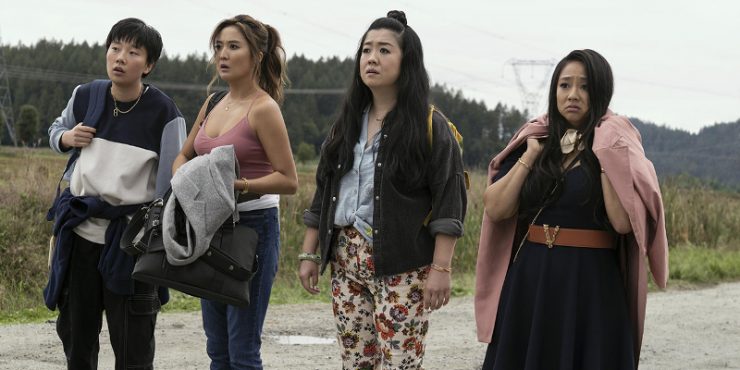We’ve had two films from earlier this year – Davy Chou’s Return to Seoul and Celine Song’s Past Lives – delve into the displacement of Korean children raised in Western countries. Both dramas, Seoul is a scabby indie that shows a French woman’s emotional spiral after searching for her birth parents, while Past Lives is a pseudo-romance about a Canadian-American emigré coming to terms with what she left behind. Add to this sub-genre Adele Lim’s Joy Ride, an adult comedy in the vain of Bridesmaids or Girls Trip, about four Chinese-American friends who travel to Beijing. The set up is primed with ample opportunity for raunchy comedy – jokes about drugs, jokes about sex, jokes about drugs being placed into sex organs – but ends up being a surprisingly poignant film about racial and cultural identity.
Joy Ride‘s similarities to Girls Trip are more readily obvious before you get to Past Lives or Seoul. Both films involve four friends on a trip where tensions simmer in between outrageous moments of humor in neon-bright locales. They also both have a softer emotional core resting within the harsher edges. There are moments in Joy Ride that feel a little try-hard in its shock value. Its funniest moments are often the familiar but caustic repartee between the four main actresses (Ashley Park, Sherry Cola, Stephanie Hsu, Sabrina Wu). Lim has writing credits on Crazy Rich Asians and Raya and the Last Dragon, but this is her directorial debut. Her film often feels more comfortable in its more sentimental moments than it does with its gross-out sight gags, but for a first time director, she shows impressive alacrity in weaving between the two.
Park plays Audrey, a Chinese girl adopted by white parents. Her best friend is Lolo (Cola), the child of Chinese immigrants. They connect as children over being the only Asian children on the playground, and while Audrey’s white upbringing has stunted her own interest in her Chinese heritage, the two girls’ friendship lasts well into adulthood. Audrey is now a successful lawyer on the verge of closing a deal that could make her a partner at her firm. Lolo, a struggling artist, lives in a guest house in Audrey’s back yard. She designs provocative art pieces that look to challenge conservative Asian values and sexualize traditional imagery. Audrey’s business deal requires her to travel to China. She brings Lolo with her as a translator, too afraid to admit to her boss (Timothy Simons) that she doesn’t speak Mandarin.
Audrey is adamant that the trip is purely business, but Lolo sees this not only as an opportunity for her friend to finally embrace her Chinese background, but a can’t-miss chance for overseas debauchery. They end up being joined by two fellow travelers. The first is Kat (Hsu), Audrey’s former college roommate turned Chinese soap opera star. Lolo is immediately threatened by their closeness and resentful of Kat’s sanctimonious behavior (she has her own past of sexual deviancy that she desperately hides). The second is Deadeye (Wu), Lolo’s socially awkward cousin. Deadeye is traveling to meet up with K-pop friends she met on the internet, but she’s also desperate to break into Lolo and Audrey’s friend group. That she doesn’t exactly possess the proper tools to do so is one of the film’s main sources of humor.
When Lolo learns that Audrey has information to look up her birth mother, she pushes her friend to make the call. Audrey is resistant, but when a reunion proves beneficial toward a closing her deal with a major Chinese client (Ronny Chieng), she decides to try finding her. Their journey places them on a train with a manic drug dealer (Meredith Hagner), in a hotel with a Chinese pro basketball team led by Baron Davis (who plays himself), and eventually on an airplane hanger where they pose as their own K-pop group in a rouse to steal a private jet. Lim is frequently upping the ante on Joy Ride‘s vulgarity, unapologetic in its broad comedic sensibility. The movie is funny, even if the humor in general feels recycled from other tawdry sex comedies of the 00s, but it’s when Joy Ride chooses to take its themes seriously that it really hits another gear.
You spend a lot of Joy Ride waiting for a twist to Audrey’s search, but credit to the script (written by Teresa Hsiao and Cherry Chevapravatdumrong) that it isn’t a twist that you’re expecting. As the women’s journey spirals further and further out of control, the story shifts into something unexpected: a legitimately cogent exploration of accepting the part of yourself you’ve been so desperate to hide. There are many jokes that come up at the expense of Audrey’s white upbringing, but those jokes also reveal the extent of her own discomfort with being caught between two worlds. Like the protagonists in Return to Seoul and Past Lives, Audrey discovers that finding peace within that bifurcated soul is work that could span a lifetime. While director Lim’s main focus on Joy Ride is getting laughs, she gives Audrey a rich characterization that makes the laughs that much sweeter.
Park, an actor known mostly for her Tony-nominated stage work and a supporting role on Netflix’s Emily in Paris, gets her first ever lead film role here. Her balancing act of playing the straight woman against the other three’s outrageous behavior while also being the emotional core of the movie is remarkably impressive, keeping the comedic tempo on track while also giving the movie its incredibly effective dramatic center. Supported by Cola, Wu, and the recently Oscar-nominated Hsu, the four leads create a core group that could certainly rival the gangs of, say, the Hangover films. But that Joy Ride has interest in something more than just escapist humor is what makes it special.
Directed by Adele Lim










